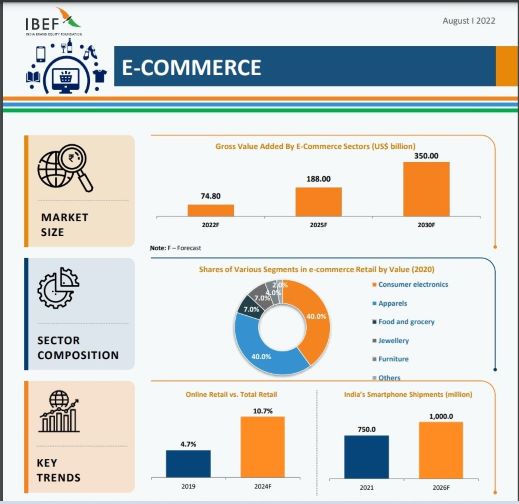This article talks about the projected growth of e-commerce, importance of site search in e-commerce, problems in keyword-based search implementations and how AI search can address these problems.
Projected growth of e-commerce
In 2021, retail e-commerce sales amounted to approximately US$5.2 trillion worldwide and is projected to grow by 56% over next years, reaching about US$8.1 trillion by 2026.

In India, the e-commerce market is expected to reach US$ 350 billion by 2030 and the share of retail e-commerce sales among the total retail sales in India is projected to grow from 4.7% in 2019 to 10.7% by 2024 (see infographic).
What are the differentiating factors driving (or could drive) this rapid growth of e-commerce? And, equally important is to understand how the product search could effect the projected growth?
We’ll address the above questions from the research studies done by reputed firms.
Morgan Stanley says that better technology is a tailwind for powering the growth of e-commerce. McKinsey goes a step further and suggests e-commerce businesses to invest in building owned data and analytics to enable flexible, full-funnel marketing as one of the five winning strategies in e-commerce business. ey study talks of the providing best customer experience that includes re-creating the benefits of in-store shopping or interacting with a sales agent.
Importance of site search in e-commerce
According to Harris Poll research, three out of four U.S. consumers (76%) report that an unsuccessful search resulted in a lost sale for the retail website, with 48% purchasing the item elsewhere. In fact, more than half (52%) say they typically abandon their entire cart and go elsewhere if there’s at least one item they can’t find.
Google research study on cart abandonment infers that 77% of U.S. consumers view a brand differently after an unsuccessful search on their websites. Outside of the United States, consumers are even more likely to say they view brands differently following an unsuccessful search, particularly in Brazil (92%), India (91%), Mexico (89%), Australia (87%), and the UK (86%).
Problems in keyword search implementations
According to a comprehensive research study from baymard, inefficient and ineffective implementations of e-commerce search will often directly misalign with users’ actual search behavior and expectations — leading to frustrating search experiences, time wasted refining queries, and abandonments.
In the same study, it was found that more than 70% of e-commerce sites return irrelevant search results for a product query. And, 1 in 4 search results throw up 0-results found page.
 An example of an incorrect search implementation is to require the users to search by the exact same product type jargon the site uses, which also includes simple typos. For e.g., in the e-commerce site UrbanLadder as shown in the graphic, typing “sofaa” returns 0-results, while a correctly spelled name “sofa” returns the list of sofas.
An example of an incorrect search implementation is to require the users to search by the exact same product type jargon the site uses, which also includes simple typos. For e.g., in the e-commerce site UrbanLadder as shown in the graphic, typing “sofaa” returns 0-results, while a correctly spelled name “sofa” returns the list of sofas.
Another example of the ineffectiveness of keyword-based search is explained in the below sketch.
 In the Beacon e-commerce site, type “Vinyl sidings from Gentek” in the search bar. It returns no results page. However, if you use filters/facets in the site, you can see that it returns 3 products.
In the Beacon e-commerce site, type “Vinyl sidings from Gentek” in the search bar. It returns no results page. However, if you use filters/facets in the site, you can see that it returns 3 products.
Also, in the baymard study it was found that 49% of sites don’t support symbols and abbreviations for even the most basic units, resulting in users missing out on perfectly relevant products. For e.g., searching for “inch” when the site has used ‘ or in in its product data.
An article in Forbes nicely summarizes the challenge of implementing a relevant search in e-commerce. In their own words: “The problem lies in actually finding the thing one wants to buy. Despite modern e-commerce sites leveraging unimaginable technology behind the scenes to learn their users’ preferences and surface recommendations to them, their search engines have evolved little from the primitive keyword queries of the Web’s earliest days.“.
Using AI/NLP search to address the e-commerce search problems
AI search that uses Natural Language Processing (NLP) can be extremely useful in providing the most relevant search results. Further, when NLP is ensembled with a high-performance Speech-to-Text deep learning model, it could be possible to provide the best possible search experience for the site users.
A good AI search implementation could not only overcome the problems associated with keyword-based search, but also facilitates site search at far less time. For e.g., in the above example of Beacon site where we are searching for “Vinyl sidings from Gentek“, an AI search understands the intent of the query by identifying “Vinyl” as material, “Sidings” as a grouping/category, “Gentek” as a brand and returns the 3 products that the site sells on their e-commerce site. And it gives results in a single search. Contrast this to getting the search results by applying filters/facets with multiple clicks as shown in the graphic.
Proxzar AI search platform can be used to implement guided search for e-commerce retail. Think of guided search as similar to hand-holding by a sales person (in a brick and mortar store) who guides the prospective customer in suggesting a right product.
Also, our unique value proposition for e-commerce wholesale businesses is it’s AI powered bulk search. In this bulk search implementation, user uploads either a text document or an image file with all the search queries (one per line). An asynchronous AI search runs and returns the bulk search results in a downloadable text file. Our professional services can help in parsing the text file and presenting the results in a UI – like a web widget or search results web page or an iOS or Android native mobile app etc..
Conclusion:
In 2021, it is estimated that 2.14 billion users shopped online. Millions of e-commerce sites (estimates varying from 12 to 24 million!) are selling their products online.
With conversion rates varying between 1.5% to 2%, it is very important to implement a comprehensive e-commerce sales strategy that provides best customer experience, which includes providing the most relevant search results.
We posit that AI search that uses NLP technology can best understand the user’s search intent and can provide the most relevant search results, which might also include personalized product recommendations.

